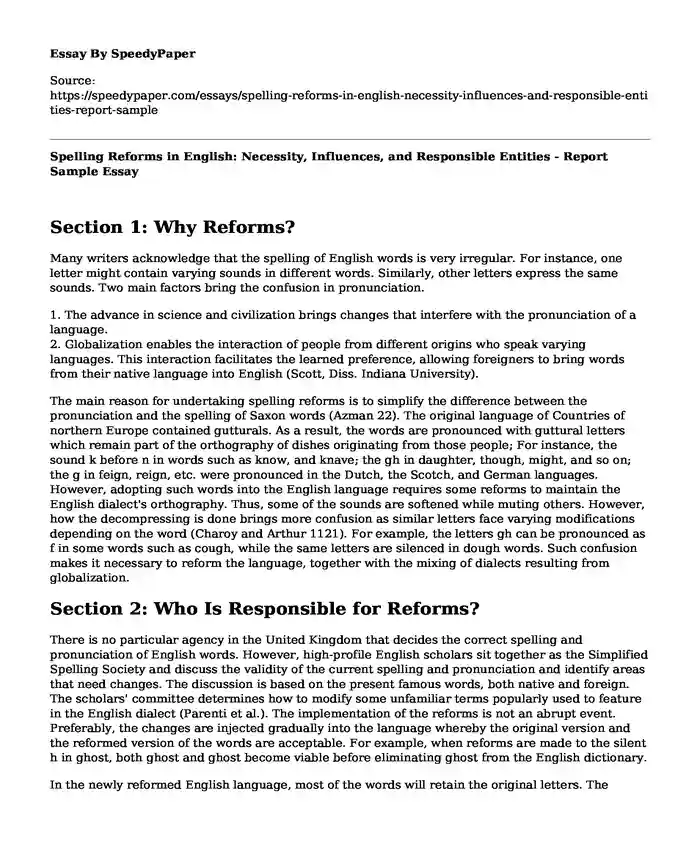
| Type of paper: | Essay |
| Categories: | Globalization Languages |
| Pages: | 3 |
| Wordcount: | 695 words |
Section 1: Why Reforms?
Many writers acknowledge that the spelling of English words is very irregular. For instance, one letter might contain varying sounds in different words. Similarly, other letters express the same sounds. Two main factors bring the confusion in pronunciation.
The main reason for undertaking spelling reforms is to simplify the difference between the pronunciation and the spelling of Saxon words (Azman 22). The original language of Countries of northern Europe contained gutturals. As a result, the words are pronounced with guttural letters which remain part of the orthography of dishes originating from those people; For instance, the sound k before n in words such as know, and knave; the gh in daughter, though, might, and so on; the g in feign, reign, etc. were pronounced in the Dutch, the Scotch, and German languages. However, adopting such words into the English language requires some reforms to maintain the English dialect's orthography. Thus, some of the sounds are softened while muting others. However, how the decompressing is done brings more confusion as similar letters face varying modifications depending on the word (Charoy and Arthur 1121). For example, the letters gh can be pronounced as f in some words such as cough, while the same letters are silenced in dough words. Such confusion makes it necessary to reform the language, together with the mixing of dialects resulting from globalization.
Section 2: Who Is Responsible for Reforms?
There is no particular agency in the United Kingdom that decides the correct spelling and pronunciation of English words. However, high-profile English scholars sit together as the Simplified Spelling Society and discuss the validity of the current spelling and pronunciation and identify areas that need changes. The discussion is based on the present famous words, both native and foreign. The scholars' committee determines how to modify some unfamiliar terms popularly used to feature in the English dialect (Parenti et al.). The implementation of the reforms is not an abrupt event. Preferably, the changes are injected gradually into the language whereby the original version and the reformed version of the words are acceptable. For example, when reforms are made to the silent h in ghost, both ghost and ghost become viable before eliminating ghost from the English dictionary.
In the newly reformed English language, most of the words will retain the original letters. The reforms come in by merely omitting a few notes or adding some cases to alter the spelling rather than the pronunciation (Bui and Hoa 363-388). Similarly, words whose accent is reformed maintain their spellings; only the pronunciation will change. The general reason for improving a language is to make it easy to learn and use, both in spelling and pronunciation. Therefore, reforming the English language is beneficial to both learners and the public. However, publishers of books who already have produced thousands of articles, books, or journals are the most likely to reject the reforms. Children will learn to spell words with ease within a short time under the new orthography. Since the orthography will be regular, children can easily avoid spelling mistakes. Matching the pronunciation to spelling will make the English language easy and entertaining.
Work Cited
Azman, Hazita. "Implementation and challenges of English language education reform in Malaysian primary schools." 3L: Language, Linguistics, Literature® 22.3 (2016): 22
Bui, Thuy Thi Ngoc, and Hoa Thi Mai Nguyen. "Standardizing english for educational and socio-economic betterment-a critical analysis of english language policy reforms in Vietnam." English language education policy in Asia. Springer, Cham, 2016. 363-388.
Charoy, Jeanne, and Arthur G. Samuel. "The effect of orthography on the recognition of pronunciation variants." Journal of Experimental Psychology: Learning, Memory, and Cognition 46.6 (2020): 1121.
Parenti, Melissa, Danielle DiMarco, and E. Francine Guestello. Growing the vocabulary of English language learners: A starter kit for classroom teachers. Rowman & Littlefield, 2018.
Scott, John Hamilton Gordon. Phonemic and phonotactic inference in early interlanguage: Americans learning German fricatives in L2 acquisition. Diss. Indiana University, 2019.
Cite this page
Spelling Reforms in English: Necessity, Influences, and Responsible Entities - Report Sample. (2024, Jan 27). Retrieved from https://speedypaper.com/essays/spelling-reforms-in-english-necessity-influences-and-responsible-entities-report-sample
Request Removal
If you are the original author of this essay and no longer wish to have it published on the SpeedyPaper website, please click below to request its removal:
- Free Essay on Asian Pacific Americans
- Free Example of Diversity Essay
- Sport Essay Sample on the History of Cricket in India
- Why the World Isn't Flat - Globalization Essay Example
- Free Essay on Time Management for Student Success
- Essay Sample on Taking Care of Family Caregivers
- Free Essay: Impacts of Terrorism on the Global Political Economy of the 21st Century
Popular categories




